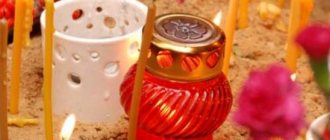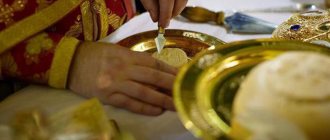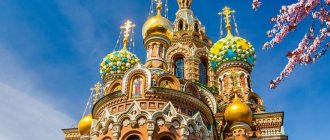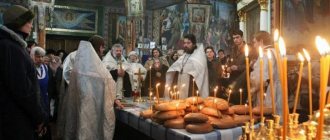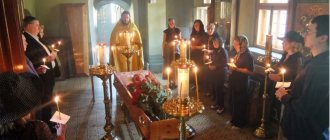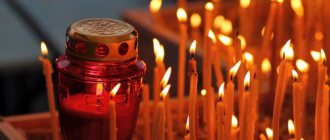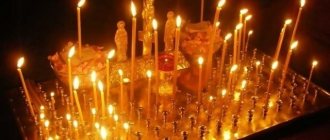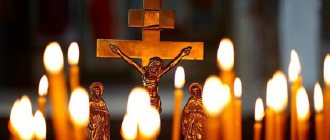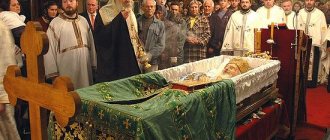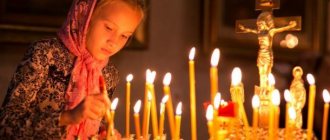Commemorations during Holy Week: “yes” or “no”?
When someone in the family passes away, the funeral usually takes place on the third day. Among the Slavic peoples, it is customary to remember the deceased, and this is done not only on the 9th and 40th days, but also six months after burial, and also after 12 months. And if the funeral took place earlier, and the commemoration falls during Holy Week, you need to know whether this can be done.
It is important to make one note here: Holy Week precedes a religious holiday such as Easter. This is a joyful event that is associated with the death and resurrection of Jesus Christ. All week Christians remember how this happened. At the same time, liturgy is performed in churches, services are held, and divine services are necessarily filled with a special prayerful spirit. And what should you do if before Easter you need to perform a wake for a deceased relative?
Prayer for a deceased Christian
Remember, O Lord our God, in the faith and hope of the eternal life of Your departed servant, our brother (name), and as Good and Lover of mankind, forgiving sins and consuming untruths, weaken, forsake and forgive all his voluntary and involuntary sins, deliver him eternal torment and fire of Gehenna, and grant him the communion and enjoyment of Your eternal good things, prepared for those who love You: even if you sin, do not depart from You, and undoubtedly in the Father and the Son and the Holy Spirit, Your glorified God in the Trinity, Faith, and Unity in the Trinity and the Trinity in Unity, Orthodox even until his last breath of confession. Be merciful to him, and faith, even in You instead of deeds, and with Your saints, as You give generous rest: for there is no man who will live and not sin. But You are the One besides all sin, and Your righteousness is righteousness forever, and You are the One God of mercies and generosity, and love for mankind, and to You we send glory to the Father and the Son and the Holy Spirit, now and ever, and to the ages of ages. Amen
Commemoration of the dead during Holy Week: the main problem
When it comes to commemorating the dead during Holy Week, one serious problem arises. Here it is enough to remember the words of the Savior and paraphrase them a little: “...you always have the dead, but not always Me.” Before Easter, all Christians should reflect on the events associated with the last days of the life of Jesus Christ. So it turns out that the relatives of the deceased can remember him on another day. But Holy Week happens only once a year.
It must be remembered that commemoration of the deceased is necessarily associated with prayer. A prayer must be performed for the soul of someone who has passed on to another world. But you just need to take into account the following: The Orthodox Church recognizes 3 levels of prayer: cell prayer, general church prayer, and also the priest before the throne. Any person, regardless of his age and gender, can pray for his deceased relative on any day, and this even applies to Easter. This applies to the cell rule. But when it is necessary to pray at a general church service, commemoration of the dead is not provided. But as for the priest’s prayers, he does not pray for the dead during the first 3 days of Holy Week.
How should one commemorate during Lent?
The topic of the wake still doesn’t want to let me go. Quite recently I wrote two articles about this - about the organization and conduct of godins, and about Muslim memorial traditions. Several of my friends read these materials and started a discussion with me.
One of them, a lady of advanced age, condemned me for writing a lot about food and little about the spiritual component of memorial events (although I myself don’t think so). Several more people reproached me for my omission: I didn’t say anything about the funeral during Lent. This reproach is really fair . And now it's time to correct the mistake. Another incident that happened at my cousin’s wake spurred me to this. They took place quite recently, during the recent Nativity Fast, and were, to put it mildly, spoiled due to the short-sightedness of their organizers.
Peculiarities of organizing and decorating a funeral table during Lent (which dishes can be served, which cannot, how to behave at the table)
The fact is that my relatives on my father’s side are not very religious and, in principle, do not bother about fasting. It seems they don’t really know when those posts even happen. And shortly before the New Year, our aunt’s fortieth birthday happened - the mother of cousins just on the paternal side. The first wake (which I also attended, of course) took place quietly and peacefully in a small cafe and with the participation of only those closest to me. But in this case, everything turned out less idyllic.
As I already noted, this happened during Lent, and on Wednesday too . Quite a few people came, since Aunt Valya was a well-known person in certain circles. She served at the conservatory for many years and sang. And for the fortieth anniversary, in addition to her relatives, her former colleagues and even some fans gathered. The table was set traditionally for a funeral, but not a Lenten one. This is what caused the misunderstanding. Many of my aunt’s friends and co-workers, as it turned out, became very religious and now sing in church choirs. At first they just sat there very unhappy, didn’t eat anything and looked at each other indignantly. But when relatives started talking about the deceased “with vodka,” a real scandal almost occurred. The ladies began to express their dissatisfaction openly. Then they stood up, read and sang the 17th kathisma and left together. My relatives were embarrassed, and the wake was crumpled.
Then my brothers and their wives very much scolded the old women who dared to protest against what was happening in such a defiant manner. To be honest, I didn’t argue with them. For what? I would still not convince them of anything at that moment, irritated and offended. But in fact, I fundamentally disagree with their position. After all, when preparing such a complex and delicate ritual event, you need to think through everything thoroughly. If the wake is held during Lent and believers, and especially churchgoers, are invited to attend, then both the table and the rules must correspond to the situation. The fact that the organizers themselves are far from Orthodox traditions does not exempt them from the need to respect other people's beliefs and ethical feelings.
The psychology of funerals has always been closely connected with their religious significance
At first they were carried out to express their respect to the deceased who was leaving for another world. Memorial events, which are usually organized not only in Russia, but also in most other countries, have ancient pagan origins. And the pagans have always attached mystical and ritual significance to a joint meal. It was believed that at funeral feasts the dead eat and drink together with the living, so the feast has always been the center of any commemoration. Nowadays, our deceased are commemorated partly simply out of custom, and partly in order to gather at the table everyone who was close to the deceased. It is sometimes important for relatives that people say good words about him and regret his departure. For many, this eases grief and helps relieve the terrible emotional stress caused by death. Modern world religions say that it is necessary to remember the dead with prayer and alms, and not with food or (especially!) drinking . It is important for the departed soul that the living pray to the Lord for all the voluntary or involuntary sins of the deceased. But no religion imposes a direct ban on funeral tables, so this tradition continues to exist.
People remember their dead also during fasting. At the same time, as life shows, the organization of funerals on fasting days, and even more so during long periods of fasting, must be approached especially carefully. If the family that hosts such meals is not religious, but religious people are expected to participate in the memorial events, then thinking about their feelings would be simply good manners. Well, Christians should not forget about the requirements of fasting. Otherwise, a modest wake may not only not help the soul of the deceased (which, in theory, is what everything is started for), but also harm it.
n value
the remnant in Christian culture
is very great.
Fasting is, first of all, abstinence, which we perform in the name of Jesus Christ. Thus we sacrifice our bodily pleasures in favor of spiritual life. Most people perceive this time, first of all, as the need to temporarily give up certain types of food and drink. Mainly from meat, dairy, fatty foods, from all sorts of luxurious dishes. And, of course, from alcohol. The list of undesirable foods varies from person to person. For example, patients, pregnant women, children and people who in life are associated with great physical activity do not fast at all or partially limit themselves. However, during Lent it is not enough just not to eat fast food. John of Damascus once correctly noted that in this case all cows would be saints. And one of my friends wittily said that many perceive fasting only as “eating sacred potatoes” and at the same time they sin worse than non-believers: they curse, are proud, and condemn everyone around them. In fact, in addition to physical abstinence, prayer and spiritual improvement are very important.
Christian fasts are:
One-day ones are
- every Wednesday and Friday (days of betrayal and crucifixion of the Savior);
- Epiphany Christmas Eve;
- the day of the beheading of John the Baptist;
- Feast of the Exaltation of the Holy Cross.
multi-day
fasts
:
The Great (also called Spring) lasts 7 weeks. It begins on the first Monday after Maslenitsa and continues until Easter. It is considered the most important and is a memory of Jesus' forty-day abstinence in the desert. The Church considers this time to be preparation for the most important holiday - Holy Easter. In the first and last week, fasting is especially strict: all light foods (meat, dairy, eggs) are prohibited, which should preferably be eaten only once a day on weekdays and twice on weekends. On Wednesdays and Fridays you can eat cold without oil, the rest of the week - hot without oil. On weekends, vegetable oil and even a little wine are allowed. But not on Saturday, which falls on Holy Week. Fish is allowed on Annunciation and Palm Sunday. And on Good Friday a complete abstinence from food is required (and some people do not eat on Holy Saturday either).- Petrov (Summer) goes from the 1st Monday after Spiritual Day to July 12 (dedicated to the Holy Apostles Peter and Paul, who always fasted before their gospel sermon). Its duration ranges from 6 to 8 weeks - it depends on the timing of Trinity and Easter. On Wednesday and Friday you can eat dry and cold food, and on other weekdays hot food is allowed: on Monday without vegetable fats, and on Thursday and Friday with vegetable oil. On weekends and holidays fish is added to it.
- Uspensky (Autumn) - from August 14 to 28 . It ends on the feast of the Dormition of the Blessed Virgin Mary and was established precisely in honor of him. He is stricter than Petrov. With a complete ban on all food, fish is allowed only on the day of the Transfiguration.
- Rozhdestvensky (Winter, Filippov) length
from November 28th to January 6th. It is dedicated to the Nativity of Christ and prepares believers for it. At this time, all food of animal origin should be excluded from the diet. Fish can only be eaten on weekends and holidays. But if holidays fall on Wednesday or Friday, then it should not be on the menu. And on Monday, Wednesday and Friday, vegetable oil is also prohibited.
lasts 40 days:
Of course, the degree of strictness of fasting can vary individually. The clergy themselves say that in the faith everyone must take upon themselves the burden they can bear. Fanaticism and excess never lead to anything good.
There was in life that was the opposite of what I described at the very beginning. When I was a student, I lived in an apartment with a granny. She was very pious, constantly went to church, read the Bible and prayers. And she fasted, of course. Moreover, I tried to adhere to monastic fasting - with a raw food diet and all other strict restrictions. At the same time, Baba Shura was a big lover of food, and after the end of the fasting period she simply pounced on eggs and meat. The matter reached the hospital, as the senile body was in shock from such drastic changes in diet. And then one day she went to a wake approximately in the middle of some fast (I think it was Petrova). The table there was modest and tempting, and grandma couldn’t resist. She ate so much from hunger that it ended with surgery for her gall bladder. Which was successfully cut out for her.
What I mean is that there should be moderation in everything. And the funeral table during fasting, even on Wednesday and Friday, does not have to be completely meager. It is not forbidden to commemorate during Lent; only the 9th, 40th days and years from weekdays are better transferred to weekends. And if the day of the funeral falls on Wednesday or Friday, then according to the rules, all plant foods are served on the table without any oil. But in our times, which are quite abundant in food, it is possible to get out of this difficult situation with dignity.
Lenten funeral menu
can be surprisingly varied. Moreover, the main traditional dishes remain the same in this case, only they are prepared without the use of animal products.
- Kutya. This dish is said to have a Greek origin
origin, and the word itself is translated as “boiled wheat.” In Ancient Greece, porridge (mostly barley) with fruit was dedicated to deceased ancestors. And in Christian Byzantium it began to be consecrated in churches. There they called it koliba
, which corresponds to our other name for kutya -
kolivo
.
There are also names for the food: eve, satiate and sochivo. It is prepared from boiled rice, wheat, and barley. Honey water, raisins, sometimes poppy seeds and nuts are added to the porridge. The grains themselves - the basis of kutya - symbolize rebirth and immortality. Sweetness and various tasty additives in it are a sign of the goodness of eternal life in Heaven. This kutya is consecrated in the church, and any funeral meal begins with it. - Pancakes and pancakes are prepared without eggs and with water. They are considered symbols of the sun, dying in the evening and rising at dawn. They are eaten after kutya. It is good to serve rosettes with honey for this purpose on a Lenten table.
- The first courses served at funerals are also very helpful during Lent. You can cook or order borscht with beans, noodles with vegetable broth, chowder made from cereals and potatoes. It is believed that steam from hot water helps the soul rise into the sky.
- For the second course, various porridges with vegetable oil or salads from beets, carrots, turnips, radishes, etc. Porridge, like kutia, is associated with the eternity of existence. And from a gastronomic point of view, they diversify the table. You can make porridge from buckwheat, barley, rice, etc. The main thing is with water.
- Fish is often allowed during fasting It is prepared fried and baked for such funerals. They serve herring and salads with it (the same one under a fur coat with lean mayonnaise), sprats and other canned food, fish pies. In Greek, the name of the fish is ichthyos
. After the advent of Christianity, the word immediately began to be perceived as an abbreviation in which the name of Jesus is encoded. And the fish itself in the early period of the development of religion was closely associated with the symbolism of the savior. Therefore, on Christian tables, fish dishes began to be considered a sign of the Christian faith. - IN funeral piesexcept fish filling
, you can put rice, buckwheat, beans, sorrel with honey, potatoes, cabbage, carrots. There are a lot of Lenten fillings, and flour on the Russian funeral table has always been traditional. - In addition to these dishes, various vegetable salads and slices, fried and salted (pickled) mushrooms, and other pickles . are also acceptable : bananas, citrus fruits, apples. Just don’t overdo it with pickles: fasting is not the time for gluttony.
Traditional drinks include kvass, compote, jelly, and honey water . For those who wish, you can stock up on mineral water, soda and store-bought juices. There are discrepancies regarding alcoholic beverages. Some argue (and in some ways they are right) that on some days of Lent, when wine is allowed, you can drink alcohol at a wake. However, the Church itself believes that it is not at all necessary to do this, so as not to turn everything into an ordinary worldly feast. Priests impose a particularly strict ban on this matter during Lent.
Behavior at memorial events
on fasting days is almost no different from how one should behave in such cases in general. That is, funny conversations and generally loud conversation and communication on extraneous topics are unacceptable at the table. Clothes for those who come should be calm, preferably dark colors. Dressing up in any special way is both bad form and a violation of customs . It is advisable for women not to wear noticeable makeup on their faces. It’s better, of course, not to wear makeup at all. And don't come to the wake uninvited.
Before the meal itself, you need to read prayers . Ideally, of course, lithium. But you can only do the 17th Kathisma, and then “Our Father.”
It is considered important to order services
in the church.
In particular, 40 liturgies.
It is very good to contact different monasteries for this, since daily services are held there. Many people order an annual reading of the church Psalter. And of course, they light funeral candles and pray – both in church and at home. And they also give alms. In general, churchgoers during Lent limit themselves only to church commemoration, and consider civil feasts to be completely unnecessary.
I think this makes sense. After all, the main thing for the soul is prayer, atonement for its sins. But still there is something in the general feast. Unless, of course, food and, most importantly, drinking become the main reason for the meeting for those gathered. After a good, proper wake, there is a feeling that the soul has been “released.” And the grief is softened. And humility came, an understanding of the inevitable. It’s just that on fast days you can make the feast time shorter, avoid speeches that are too long, try not to make your farewell words look like toasts - as happened at the funeral evening at my cousins’. Try to combine the strict spirituality of faith and canon and the sincere sincerity of people who loved the departed and therefore came here. This will probably be closest to ideal.
Interesting articles:
Why doesn’t the Church pray for the unbaptized, and how can you do this yourself?
What kind of memorial for loved ones is usually held a year after death?
Commemorations for Holy Week
The Orthodox Church adheres to the instructions of the Nomocanon. According to the prescribed rules, remembering the deceased, if we are talking about fortieth day, must be done exactly on time, that is, on the fortieth day after the funeral. The only exception is Easter. But commemorations on the 3rd, 9th day, as well as both semi-annual and annual commemorations are necessarily postponed. But this applies to situations where funeral services are not provided.
What do they take to the cemetery for 40 days?
According to traditions, on memorial days, people go to the cemetery to say goodbye to a loved one. You need to take flowers with you to the grave, of which there should be a pair, and a candle. With these objects, the living can express their respect to the deceased. You cannot talk loudly at the grave, have snacks, and especially drink alcohol. Another important point regarding what is brought to the cemetery for 40 days is that as a treat for the deceased, you can take a plate of kutya from home and leave it at the grave.
Funerals during Holy Week: highlights
If it is necessary to perform a funeral during Holy Week, there is nothing that can be done about it. Grief most often comes suddenly to a home. People die during Holy Week and even on Easter. Some Christians even rejoice at this, because they have to bury a relative on such a bright holiday. If a person passes away on Saturday, according to Orthodox traditions it is customary to bury him on the third day. But what to do if he died on Maundy Thursday, whether he can be buried before Easter or not, not everyone knows about this.
There is no problem here; it is much more difficult when the deceased has to be buried on Good Friday. According to Christian canons, this is not prohibited, but there is another difficulty. But will it be possible to organize a funeral service on this day - that’s where the difficulty lies. To perform the funeral service, you need to invite a priest. And he will prepare for the festive liturgy. Therefore, it is better to go to the temple and talk to him. Only he can give an explanation about the funeral service and say whether it will be possible to bury the deceased according to the Orthodox rite. It may turn out that it is better to postpone the funeral processes to Saturday or perform them a day earlier.
So it turns out that to the question of whether it is possible to bury during Holy Week, the answer only at first glance turns out to be simple. In this case, you need to think about such moments as a memorial service and funeral service, and preferably remember your deceased relative on the third day. But it is customary to bury the dead with the help of a priest. In addition, when the remembrance takes place, it is also advisable to invite him. During Holy Week, and especially on Friday, it will not always be possible to invite him, and this is due to his busyness.
Drinks for the funeral table
The presence of alcoholic beverages at the funeral table is not welcomed by the church, but this ban is practically not observed. If you cannot do without alcohol at the funeral table, there should not be a lot of it. As a rule, the calculation is taken from three small glasses per person. You can also put red wine, in this case the calculation is for one person - 1-2 glasses.
The main drinks at the funeral table are non-alcoholic - jelly or compote. You can also make homemade lemon-ginger lemonade or berry juice.
At the end of the funeral dinner, sweets and cookies, as well as towels and scarves are distributed to everyone who came. Also in some regions it is customary to distribute dishes and some personal belongings of the deceased.
If a funeral falls on Holy Saturday
If a funeral is planned on Holy Saturday, it is not advisable to postpone it. On this day, the Church should remember two events that are associated with Jesus Christ. Firstly, this is His burial, and secondly, how He descended into hell. If the funeral takes place on the Saturday before Easter, then a memorial service is not celebrated in the church. Just like on Maundy Thursday, this is not done on Friday.
Although these are the days of Great Lent, Christians must prepare for the great solemn event - the remembrance of the Resurrection of Christ. It is advisable to protect yourself from everything sad and sorrowful. Funerals are held on Holy Saturday if an Orthodox Christian has lost his life, but one should not rely on funeral prayers at a public service. Even if they are carried out, there will be no benefit from them not only to the deceased, but also to his relatives.
Prayer for the departed
Rest, O Lord, the souls of Your departed servants: my parents, relatives, benefactors (their names) and all Orthodox Christians, and forgive them all sins, voluntary and involuntary, and grant them the Kingdom of Heaven.
It is more convenient to read names from a commemoration book - a small book where the names of living and deceased relatives are written down. There is a pious custom of conducting family memorials, reading which both in home prayer and during church services, Orthodox people remember by name many generations of their deceased ancestors.
conclusions
If you have certain doubts about funerals and commemorations during Holy Week, you can always go to church and consult with a priest. And this will have to be done in any case if you have to bury an Orthodox Christian. The main thing here is to know how these issues are resolved in your temple. It is very important for the soul of any deceased Christian to be commemorated in church so that a memorial service can be served. And his living relatives can submit a note about this.
Lenten salads for the funeral table
You can diversify the funeral table with lean salads. The following salads are most often included in the funeral menu:
- Lenten "Olivier" without adding sausage or meat.
- Cabbage and cucumber.
- The vinaigrette.
- Salad of beans and croutons.
- Corn with cucumbers and herbs.
- Assorted tomatoes, cabbage and cucumber.
- Sauerkraut and pickled cucumber salad.
To dress salads at the funeral table during Lent, use only sunflower oil, mushroom or soy sauce, and vegetable dressings. You can also serve vegetable cutlets made from carrots and onions, lean cabbage rolls with rice and sauté, stuffed peppers with cabbage or rice at the funeral table.
